动词的时态和语态专题
- 格式:pdf
- 大小:259.39 KB
- 文档页数:32
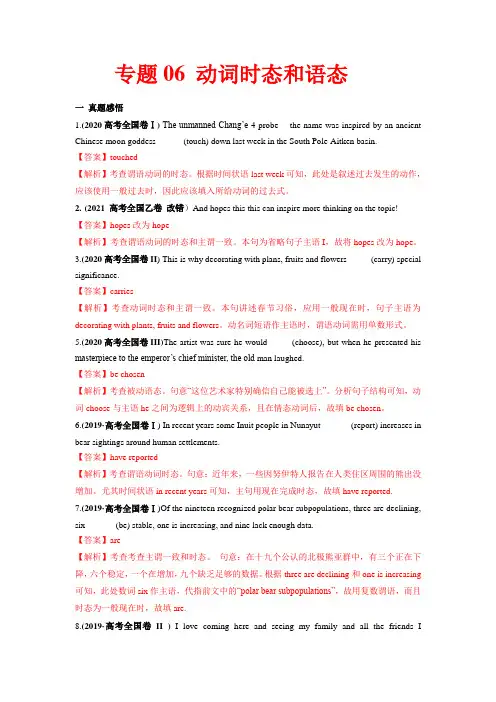
专题06 动词时态和语态一真题感悟1.(2020高考全国卷Ⅰ)The unmanned Chang’e-4 probe -- the name was inspired by an ancient Chinese moon goddess--_____(touch) down last week in the South Pole-Aitken basin.【答案】touched【解析】考查谓语动词的时态。
根据时间状语last week可知,此处是叙述过去发生的动作,应该使用一般过去时,因此应该填入所给动词的过去式。
2.(2021 高考全国乙卷改错)And hopes this this can inspire more thinking on the topic!【答案】hopes改为hope【解析】考查谓语动词的时态和主谓一致。
本句为省略句子主语I,故将hopes改为hope。
3.(2020高考全国卷II) This is why decorating with plans, fruits and flowers _____(carry) special significance.【答案】carries【解析】考查动词时态和主谓一致。
本句讲述春节习俗,应用一般现在时,句子主语为decorating with plants, fruits and flowers。
动名词短语作主语时,谓语动词需用单数形式。
5.(2020高考全国卷III)The artist was sure he would _____(choose), but when he presented his masterpiece to the emperor’s chief minister, the old man laughed.【答案】be chosen【解析】考查被动语态。
句意“这位艺术家特别确信自己能被选上”。
分析句子结构可知,动词choose与主语he之间为逻辑上的动宾关系,且在情态动词后,故填be chosen。
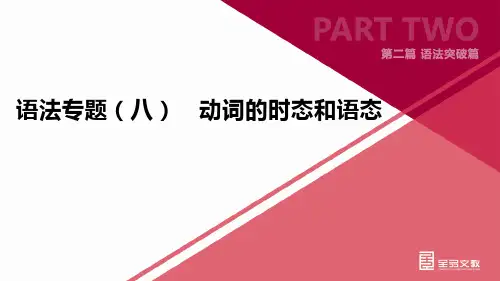
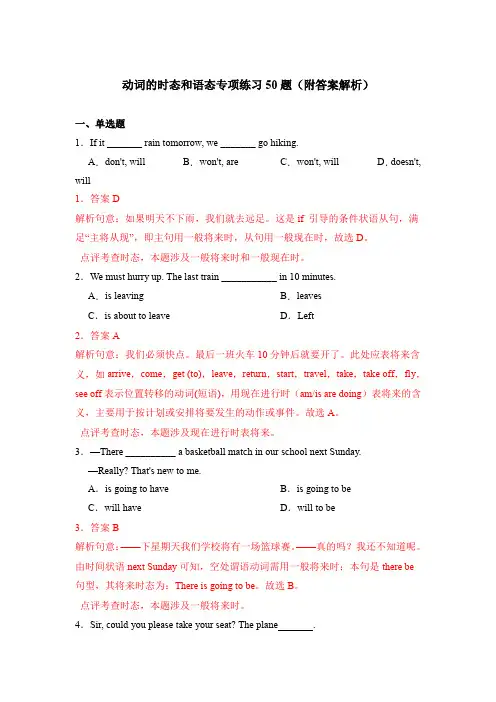
动词的时态和语态专项练习50题(附答案解析)一、单选题1.If it _______ rain tomorrow, we _______ go hiking.A.don't, will B.won't, are C.won't, will D.doesn't, will1.答案D解析句意:如果明天不下雨,我们就去远足。
这是if 引导的条件状语从句,满足“主将从现”,即主句用一般将来时,从句用一般现在时,故选D。
点评考查时态,本题涉及一般将来时和一般现在时。
2.We must hurry up. The last train ___________ in 10 minutes.A.is leaving B.leavesC.is about to leave D.Left2.答案A解析句意:我们必须快点。
最后一班火车10分钟后就要开了。
此处应表将来含义,如arrive,come,get (to),leave,return,start,travel,take,take off,fly,see off表示位置转移的动词(),用现在进行时(am/is are doing)表将来的含义,主要用于按计划或安排将要发生的动作或事件。
故选A。
点评考查时态,本题涉及现在进行时表将来。
3.—There __________ a basketball match in our school next Sunday.—Really? That's new to me.A.is going to have B.is going to beC.will have D.will to be3.答案B解析句意:——下星期天我们学校将有一场篮球赛。
——真的吗?我还不知道呢。
由时间状语next Sunday可知,空处谓语动词需用一般将来时;本句是there be句型,其将来时态为:There is going to be。
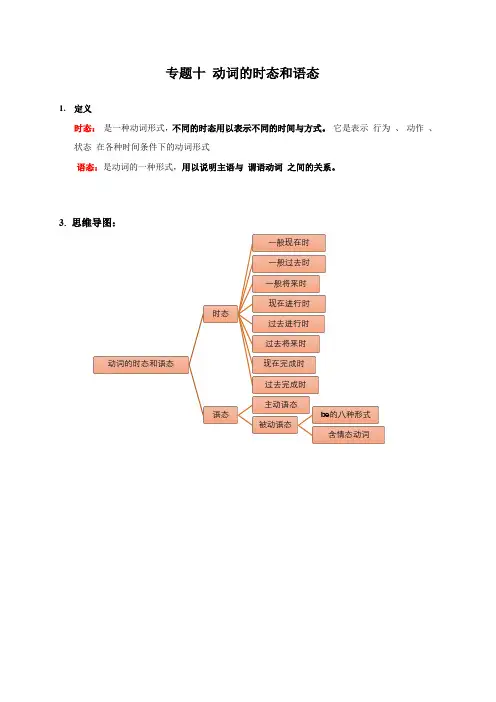
专题十动词的时态和语态1.定义时态:是一种动词形式,不同的时态用以表示不同的时间与方式。
它是表示行为、动作、状态在各种时间条件下的动词形式语态:是动词的一种形式,用以说明主语与谓语动词之间的关系。
3. 思维导图:动词的时态和语态时态一般现在时一般过去时一般将来时现在进行时过去进行时过去将来时现在完成时过去完成时语态主动语态被动语态be 的八种形式含情态动词1.动词的时态1.常考的时态构成及用法a.一般现在时d.现在进行时e.过去进行时f.过去将来时g.现在完成时h.过去完成时2. 动词的语态a. 分类:主动语态:表示主语是动作的执行者被动语态:表示并语是动作的执行者c.主动语态和被动语态的转换规则典型例题总分:50分姓名:得分:1.单选题(每小题1分,共50分)( ) 1. Jenny, together with the Greens the White Tower Park if it tomorrow.A.are going to; isn't rainyB.is going to; doesn't rainC.are going to; won't rainD.is going to; isn't rain( ) 2. The old man for quite some time.A.has diedB.dieC.has deadD.has been dead( ) 3. It is reported that a tall building in the city next year.A.will be builtB.were buildC.have builtD.will build( ) 4. My sister for 2 years.A.has marriedB.have got marriedC.has been marriedD.married( ) 5. Chinese ________in many schools around the world and many people love to learn it.A.teachesB.is teachingC.has taughtD.is taught( ) 6. When Tom was in primary school, he ________the piano every day.A.playsB.playedC.was playingD.has played( ) 7. A baby's first month birthday is a special event in China and _____with a special Party.A.celebratesB.is celebratedC.was celebratedD.will celebrate( ) 8. -Were you at home at 9 o'clock last night?-Yes, I a shower at that time.A.tookB.was takingC.was takenD.am taking( ) 9. National Day celebrations for China's seventieth birthday in about three months.A.will be heldB.will holdC.is heldD.was held( ) 10. We don't know if he tomorrow. If he, I will call youA.will come, will comeB.will come, comeses, will comees, comes( ) 11. He told me that he ______ his uncle in Thailand the next day.A.will visitB.has visitedC.is going to visitD.would visit( ) 12. -Tom, do you know ________? -In Beijing.A.where will the 24th Winter Olympics be heldB.where the 24th Winter Olympics will holdC.where the 24th Winter Olympics will be heldD.where will the 24th Winter Olympics hold( ) 13. Peter with his classmates ________ for the bus when the earthquake happened.A.is waitingB.was waitingC.are waitingD.were waiting( ) 14. his museum ________ here for over 80 years. It ________ one of the oldest buildings in this city.A.is; wasB.had been; isC.was; has beenD.has been; is( ) 15. -Mrs. Brown, how long can books from the school library ?-At most two weeks.A.borrowB.keepC.be borrowedD.be kept( ) 16.-An AI robot _____in our school dining hall next term.-I'm looking forward to it.A.will useB.will be usedC.is usedD.was used( ) 17. Usually a baby's face ____ smooth.A.is feelingB.feltC.feels likeD.feels( ) 18. She _____ an English magazine when I came in.A.readsB.has readC.will readD.was reading( ) 19. I will call you as soon as he______ here.A.arriveB.will arriveC.arrivesD.arrived( ) 20. Boys and girl, ______ learning and have fun!A.keepB.to keepC.keepingD.kept( ) 21. There ______a basketball game between these two grades in the gym this afternoon.A.willB.is going to haveC.is going to beD.will have( ) 22. We ______TV from seven to nine last night.A.were watchingB.will watchC.watchedD.watch( ) 23. Jack's mother taught me how ________ Yunnan rice noodles last weekend.A.to makeB.makingC.makeD.to making( ) 24. Mrs. Green said the plates ________ right away,or they would become difficult to wash.A.will be washedB.should washC.will washD.should be washed( ) 25. The documentary Under the Dome (《苍穹之下》)which ________ by Chai Jing showed us that the air pollution in China was very serious.A.producesB.producedC.is producedD.was produced( ) 26. -What did you do last night?- I ________ my homework and watched TV.A.didB.doC.am doingD.will do( ) 27.The hospital is very famous. It _______ in 2001.A.buildsB.builtC.was builtD.is built( ) 28.These rules are made the disabled.A.protectB.protectedC.to protectD.protecting( ) 29. -How much does the TV ?-Not too much. It's just a second-handed one.A.costB.spendC.takeD.pay for( ) 30. -Have you ever ________ an amusement park?- Yes, I have ________ Fun Times Amusement Park last year.A.been to, have gone toB.gone to, have been toC.go to, went toD.been to, went to( ) 31.We are glad to hear that the terrorists ________ by the brave policemen several days ago.A.are caughtB.were caughtC.have been caughtD.are going to be caught ( ) 32. -Why didn't you go to the party last night? - Because I _____.A.wasn't invitedB.didn't invitedC.haven't invitedD.don't invited ( ) 33. -What _____ you supposed ____ when you are in China?- You should shake hands.A.are, to doB.do, to doC.are, doingD.have, to do( ) 34. So far, we ________ English for three years.A.have learntB.learnC.learntD.had learnt( ) 35.The boy was made ______ the words again and again.A.copyB.copyingC.copiesD.to copy( ) 36. The sports meeting in our school now.A.being heldB.is havingC.is holdingD.is being held( ) 37. The window ____ ten minutes ago, and the room is bright now.A.can be cleanedB.is cleanedC.was cleanedD.will be cleaned( ) 38. -Oh, Mrs. King, your necklace looks nice. Is it new?-No, I _______ it for 2 years.A.hadB.have hadC.boughtD.have bought( ) 39. He has ordered a watch on line for his father and it _______ to him before Father's Day.A.sendB.will be sentC.was sentD.sent( ) 40. There ______ a funny cartoon on CCTV 6 this evening.A.willB.will haveC.is going to beD.is going to have( ) 41. -________ did your uncle leave his home town? -He ___________ for nearly twenty years.A.When, has leftB.When, has been awayC.How long, has leftD.How long, has been away ( ) 42. My uncle ________ Germany on business many times.A.has been onB.has gone toC.has been toD.has been in( ) 43. Her life ________ a lot during the last three years.A.changedB.changingC.has changedD.will change( ) 44. -Lisa was seen ______ an old man go across the street this morning. -What a kind girl she is!A.helpingB.helpedC.to helpD.helps( ) 45. My computer has broken down. I'll get it _______ this afternoon.A.repairsB.repairedC.to repairD.repairing。
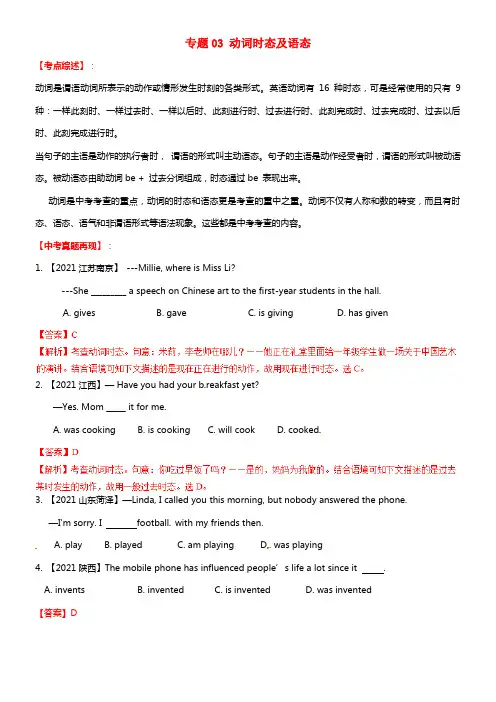
专题03 动词时态及语态【考点综述】:动词是谓语动词所表示的动作或情形发生时刻的各类形式。
英语动词有16种时态,可是经常使用的只有9种:一样此刻时、一样过去时、一样以后时、此刻进行时、过去进行时、此刻完成时、过去完成时、过去以后时、此刻完成进行时。
当句子的主语是动作的执行者时,谓语的形式叫主动语态。
句子的主语是动作经受者时,谓语的形式叫被动语态。
被动语态由助动词be + 过去分词组成,时态通过be 表现出来。
动词是中考考查的重点,动词的时态和语态更是考查的重中之重。
动词不仅有人称和数的转变,而且有时态、语态、语气和非谓语形式等语法现象。
这些都是中考考查的内容。
【中考真题再现】:1. 【2021江苏南京】---Millie, where is Miss Li?---She _________ a speech on Chinese art to the first-year students in the hall.A. givesB. gaveC. is givingD. has given2. 【2021江西】— Have you had your b reakfast yet?—Yes. Mom _____ it for me.A. was cookingB. is cookingC. will cookD. cooked3. 【2021山东菏泽】—Linda, I called you this morning, but nobody answered the phone.—I'm sorry. I football with my friends then.A. playB. playedC. am playingD. was playing4. 【2021陕西】The mobile phone has influenced people’s life a lot since it .A. inventsB. inventedC. is inventedD. was invented【答案】D【解析】考查动词时态及语态。
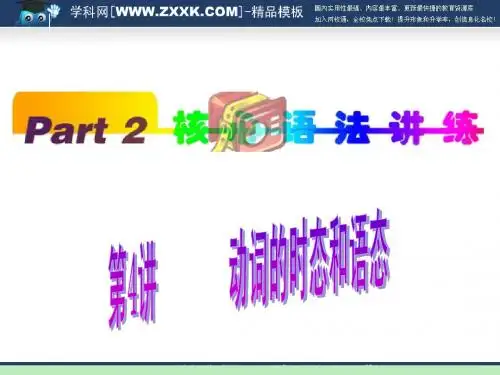

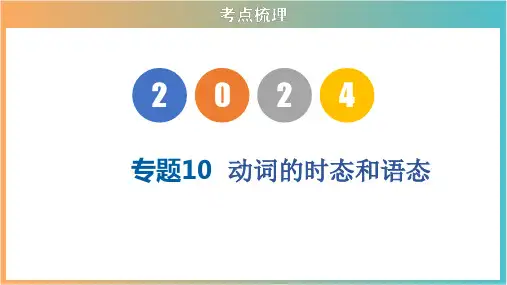
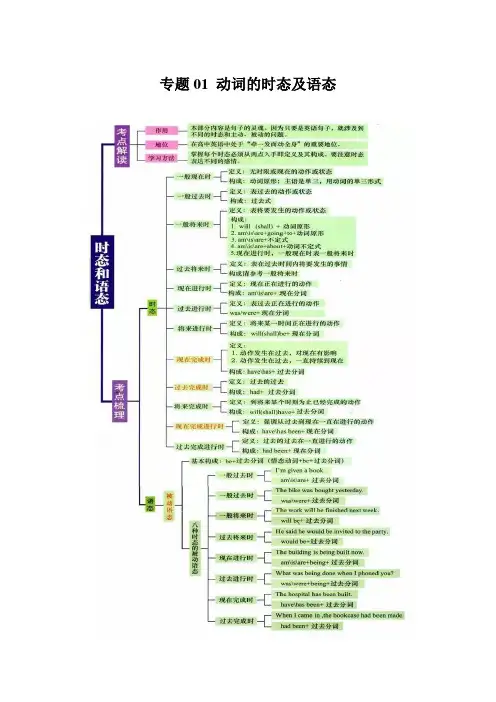
专题01 动词的时态及语态时态知识梳理重点用法1 一般现在时用法:1.be(am,is,are)动词的使用由主语的人称和数决定。
行为动词的第三人称单数加-s/es,其余人称用动词原形。
I am free tonight.我今晚有空。
The boy is ten years old.这个男孩10岁了。
They are students.他们是学生。
Bill often helps others.We like him a lot.比尔总是帮助他人。
我们很喜欢他。
2.表示经常、习惯性发生的动作或存在的状态。
It often rains in our city.我们的城市经常下雨。
3.表示普遍真理和客观真实。
The earth moves round the sun.地球围绕太阳转。
4.表示心理状态或情感的动词往往用一般现在时。
She hates rock music.她讨厌摇滚乐。
5.在时间、条件状语从句中表示将来的动作。
I will call on you as soon as I am free.我空闲时会去拜访你。
提示:一般现在时可以用来代替一般将来时,表示已经预先计划或安排的肯定将要发生的动作,句中常有表示将来时间的状语。
这一用法主要用于下列动词,如果arrive(到达),be (是),begin(开始),come(来到),go(去),leave(离开),reach(到达),start(出发)等。
The train leaves at eight o’clock.火车8点钟开车。
注意:一般现在时常用的时间状语有:today今天often经常always一直sometimes有时usually通常seldom很少on Sunday在星期天every day/week/morning每天/每周/每天早上重点用法2 一般过去时用法:1.be(was/were)动词的使用由主语的人称和数决定。
行为动词都要用过去式。
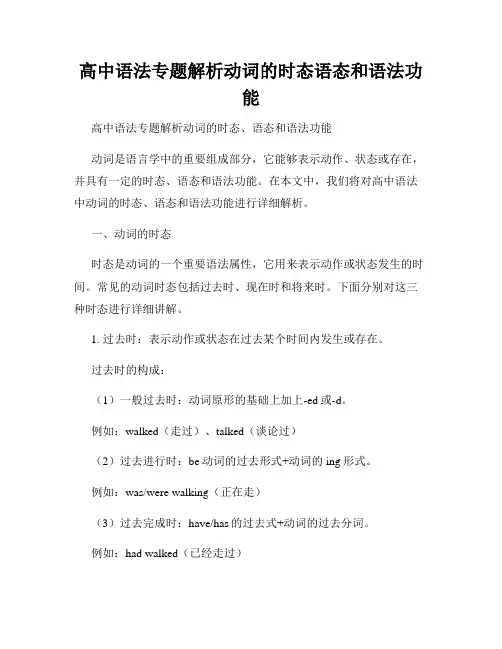
高中语法专题解析动词的时态语态和语法功能高中语法专题解析动词的时态、语态和语法功能动词是语言学中的重要组成部分,它能够表示动作、状态或存在,并具有一定的时态、语态和语法功能。
在本文中,我们将对高中语法中动词的时态、语态和语法功能进行详细解析。
一、动词的时态时态是动词的一个重要语法属性,它用来表示动作或状态发生的时间。
常见的动词时态包括过去时、现在时和将来时。
下面分别对这三种时态进行详细讲解。
1. 过去时:表示动作或状态在过去某个时间内发生或存在。
过去时的构成:(1)一般过去时:动词原形的基础上加上-ed或-d。
例如:walked(走过)、talked(谈论过)(2)过去进行时:be动词的过去形式+动词的ing形式。
例如:was/were walking(正在走)(3)过去完成时:have/has的过去式+动词的过去分词。
例如:had walked(已经走过)2. 现在时:表示动作或状态在现在时间内发生或存在。
现在时的构成:(1)一般现在时:动词原形。
例如:walk(走)、talk(谈论)(2)现在进行时:be动词的现在形式+动词的ing形式。
例如:am/is/are walking(正在走)(3)现在完成时:have/has+动词的过去分词。
例如:have walked(已经走过)3. 将来时:表示动作或状态将要发生。
将来时的构成:(1)一般将来时:will/shall+动词原形。
例如:will/shall walk(将要走)(2)将来进行时:will/shall+be动词的现在分词+动词的ing形式。
例如:will/shall be walking(将要正在走)(3)将来完成时:will/shall+have+动词的过去分词。
例如:will/shall have walked(将要已经走过)二、动词的语态语态是动词的一种形式,用来表示动作的主体与动作所涉及的对象之间的关系,常见的语态有主动语态和被动语态。
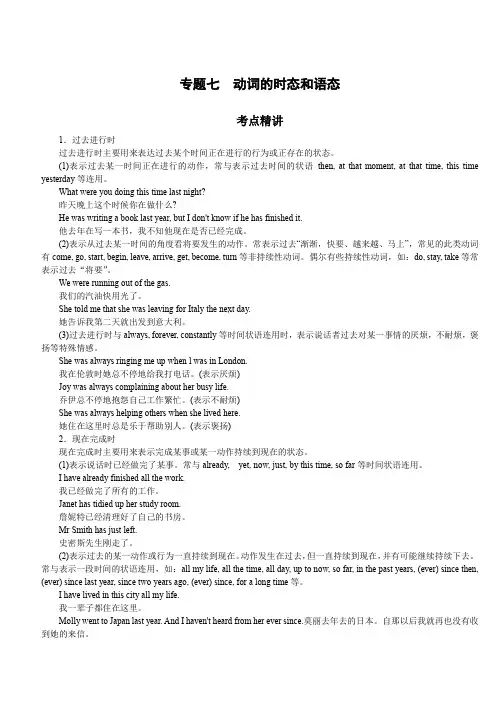
专题七动词的时态和语态考点精讲1.过去进行时过去进行时主要用来表达过去某个时间正在进行的行为或正存在的状态。
(1)表示过去某一时间正在进行的动作,常与表示过去时间的状语then, at that moment, at that time, this time yesterday等连用。
What were you doing this time last night?昨天晚上这个时候你在做什么?He was writing a book last year, but I don't know if he has finished it.他去年在写一本书,我不知他现在是否已经完成。
(2)表示从过去某一时间的角度看将要发生的动作。
常表示过去“渐渐,快要、越来越、马上”,常见的此类动词有come, go, start, begin, leave, arrive, get, become, turn等非持续性动词。
偶尔有些持续性动词,如:do, stay, take等常表示过去“将要”。
We were running out of the gas.我们的汽油快用光了。
She told me that she was leaving for Italy the next day.她告诉我第二天就出发到意大利。
(3)过去进行时与always, forever, constantly等时间状语连用时,表示说话者过去对某一事情的厌烦,不耐烦,褒扬等特殊情感。
She was always ringing me up when l was in London.我在伦敦时她总不停地给我打电话。
(表示厌烦)Joy was always complaining about her busy life.乔伊总不停地抱怨自己工作繁忙。
(表示不耐烦)She was always helping others when she lived here.她住在这里时总是乐于帮助别人。
动词的时态和语态专题练习The document was prepared on January 2, 2021高中英语语法时态和语态一.动词的时态时态是谓语动词所表示的动作或情况发生时间的各种形式.英语动词有16种时态,但是常见的只有九种:一般现在时、一般过去时、一般将来时、现在进行时、过去进行时、现在完成时、过去完成时、过去将来时、现在完成进行时.(一)一般现在时do / does1.具体用法1 表示经常性或习惯性动作We always care for each other and help each other. 我们总是互相关心互相帮助.He goes to school every day.2)表示现在的特征或状态He is very happy.Do you sing ----A little.3)表示普遍真理Light travels faster than sound. 光速比声速快.Actions speak louder than words. 行动胜过言语.常与一般现在时态连用的词或短语主要有:often, usually, sometimes, every day, every morning/afternoon, on Sundays/weekends等等.I often go to the cinema on Sundays. 我经常星期天去看电影.He goes to work early every day. 他每天上班很早.二一般过去时 did1表示过去某一特定时间所发生的、可完成的动作或状态,常与表示确切过去时间的词、短语或从句连用.例如:We went to the pictures last night and saw a very interesting film.2表示过去习惯性动作.例如:He always went to class last.I used to do my homework in the library.三一般将来时 will / shall do1表示将来打算进行或期待发生的动作或状态.例如:I shall graduate next year.2一般将来时有时可以表示一种倾向或习惯性动作.如Crops will die without water.You won’t succeed without their support.3 几种替代形式:be going to +v在中广泛使用,表示准备做或将发生的事情.例如:I'm going to buy a house when we've saved enough money.be to +v表示计划安排要做的事,具有"必要"的强制性意义.例如:I am to play tennis this afternoon.be about to +v表示即将发生的事情.例如:He was about to start.be due to +v表示预先确定了的事, 必定发生的事.例如:The train is due to depart in ten minutes.5少数动词如:begin, come, leave, go, arrive, start, stop, return, open, close等的一般现在时可用来表示将来的动作.多用来表示按计划事先安排好即将发生的动作,句中通常还有一个表示将来的时间状语.例如:The meeting begins at seven.The train starts at nine in the morning.四现在进行时 is / are doing1)表示现在某时或某段时间内正在进行的动作.常与现在进行时连用的词组是now, right now,at the mother,for the time being,for the present, 或某个具体的时间几点钟.He is writing a letter now.She is visiting Beijing this week.2)有时用来代替一般现在时态,表示一个经常性动作或状态,这时是为了表示一种感情如赞叹,厌烦,满意,不满等He is always thinking of his work. 表示赞许The boy is always talking in class. 表示不满3 有时用来表示一个在最近按计划或安排要进行的动作这时多有一个表示未来的时间的状语We are leaving on Friday. 我们星期五动身.How many of you are coming to the party五现在完成时have / has done1现在完成时用来表示对目前状况仍有影响的,刚刚完成的动作常与yet,already,just连用,或者过去某一时刻发生的,持续到现在的情况常与for,since连用.例如:I have just finished my homework.Mary has been ill for three days.2常与现在完成时连用的时间状语有:since, for, during, over等引导出的短语;副词already, yet, just, ever, now, before, often, lately, recently等;状语词组this week morning, month, year, so far, up to now, many times, up to the present等.例如:So far, she hasn't enjoyed the summer vacation.There have been a lot of changes since 1978.3完成时态可用在下列结构中:This That, It is was the first second... time +定语从句;This That, It is was the only last + n +定语从句;This That, It is was +形容词最高级+ n +定语从句.如果主句的谓语动词是一般现在时,从句的谓语动词通常用现在完成时;如果主句谓语动词是一般过去时,从句谓语动词通常用过去完成时.例如:1This is one of the rarest questions that have ever been raised at such a meeting.2There was a knock at the door. It was the second time someone had interrupted me that evening.六过去进行时 was / were doing过去进行时表示一个过去的动作发生时或发生后,另一个过去的动作正在进行,或表示过去反复的习惯,常与always,continually,constantly等动词连用.例如:1We were discussing the matter when the headmaster entered.2Whenever I visited him, he was always writing at the desk.七过去完成时 had done1表示过去某时间前已经发生的动作或情况,这个过去的时间可以用by,before等介词短语或一个时间状语从句来表示;或者表示一个动作在另一个过去动作之前已经完成.例如:1We had just had our breakfast when Tom came in.2By the end of last year they had turned out 5, 000 bicycles.2动词expect, hope, mean, intend, plan, suppose, wish, want, desire等用过去完成时,表示过去的希望、预期、意图或愿望等没有实现.例如:I had meant to take a good holiday this year, but I wasn't able to get away.另外两种表示"过去想做而未做的事"的表达方式是:1was / were + to have done sth, 例如:We were to have come yesterday, but we couldn't.2intended expected, hope, meant, planned, supposed, wished, wanted, desired + to have done sth, 如:I meant to have told you about it, but I forgot to do so.3过去完成时常用于以下固定句型:1hardly, scarcely, barely + 过去完成时+ when + 过去时.例如:Hardly had I got on the bus when it started to move.2no sooner +过去完成时+ than +过去时.例如:No sooner had I gone out than he came to see me.3by the end of +过去时间,主句中谓语动词用过去完成时.例如:The experiment had been finished by 4 o'clock yesterday afternoon.八一般过去将来时1. 一般过去将来时的形式Should / would+ 动词原形was / were + 动词-ing形式2. 一般过去将来时常用于宾语从句中,其主语的谓语动词为过去时态,可表示从过去某时看来将要发生的事情,如:He said that he would speak at the meeting.He was sixty-eight. In two years he would be seventy.九现在完成进行时 has / have been doing现在完成进行时表示过去某一时刻之前开始的动作或状态一直延续到过去某一时刻.例如:I have been looking for my lost book for three days, but I still haven't found it.运用动词时态要注意的几个问题一在时间和条件等状语从句中不要用将来时态,如We’ll give him the book if he wants it.He decided to fight back if he was hit again.I’ll call you as soon as I’ve finished my work.二时态的一致时态的呼应,如We saw that the smoke was coming from a window.I didn’t know if she would come.He admitted that he had been on the march.不进行时态调整的情况:1从句说的是一种普遍真理,如:Long ago, people didn’t know the earth moves round the sun.2当从句的谓语改成过去时可能造成误会,如Did he say that the train leaves at 5:30三瞬间动词在完成时态中的使用,如:误:I have received her letter for three months.正:I received her letter three months ago.正:It is three months since I received her letter.四注意某些要求一定时态的句型was/ were doing sth. when …did sth.I was reading a book when the bell rangwas/were about to do sth. when … did sth.We were about to leave when the telephone rang.She was about to go out when it started to rain表示做事做了第几次或共几次,要用完成时态,如:It’s the first time I’ve seen her.We have been there three times.It is / has been… since…It is has been two weeks since I came here.She said it was five hours since she had finished her work.hardly…when…We had hardly got in the crops when it began to rain.Hardly had we got in the crops when it began to rain.no sooner…than…I had no sooner come into the room than the door was closed.No sooner had I come into the room than the door was closed.二.动词的语态语态也是动词的一种形式,英语有两种语态:主动语态和被动语态.主动语态表示主语是动作的执行者,而被动语态表示主语是动作的承受者.1We use electricity to run machines. 主动语态2Electricity is used to run machines. 被动语态1.不能用于被动语态的动词和短语1在英语中,不及物动词不能用于被动语态,但有些不及物动词包括短语容易引起误用.如:appear, belong, belong, die, escape, fall, happen, last, remain, succeed, occur, come true, take place, consist of.2某些表示状态或特征的及物动词,如:become, contain, cost, fit, have, resemble, suit也没有被动语态.2.被动语态的时态形式常用的被动语态有下表所列的几种时态形式.时间一般时进行时完成时现在 am asked am being askedis asked is being askedare asked are being asked过去 was be asked was being askedwere be asked were being asked将来 shall be asked shall have been asked will be asked will have been asked过去 should be asked should have been asked将来 would be asked would have been asked 3.短语动词的被动语态短语动词转换为被动语态时,通常被看作是一个动词,后面的介词或副词不能拆开或省略.例如:1So far no correct conclusion has arrived at.2All the rubbish should be got rid of.4."get + -ed分词"的被动语态"get + -ed分词"结构强调动作的结果,而非动作本身,常用来表示突发性的,出乎意料的偶然事件.例如:The boy got hurt on his way home from work.另外,"get + -ed分词"还可用于谈论为自己做的事,是主动的行为而不是被动的行为.例如:get dressed穿衣服 get divorced离婚get engaged订婚get confused迷惑不解get lost迷路get washed洗脸get married结婚5.被动语态与系表结构的区别1The novel was well written.系表结构2The novel was written by Diskens.被动语态6.不能用于被动语态的及物动词,如:have, fit, hold, lack, cost…I have a computer.The hall can hold 200 people.7. 主动性式表被动意义①当feel、look、smell、taste、sound等后面接形容词时;当cut、read、sell、wear、write等词带状语修饰语时;当动词表示“开始、结束、关、停、转、启动”等意义时.This kind of cloth washes easily.这种布易洗.These novels won’t sell well.这些小说不畅销.My pen writes smoothly.我的钢笔写起来很流畅.The door won’t lock.门锁不上.The fish smells good.鱼闻起来香.②当break out、take place、shut off、turn off、work out等动词表示“发生、关闭、制定”等意思时.The plan worked out successfully.The lamps on the wall turn off.③want, require, need后面的动名词用主动表示被动含义.④be worth doing用主动形式表示被动含义.⑤在“be + 形容词+ to do”中,不定式的逻辑宾语是句子的主语,用主动代被动.This kind of water isn’t fit to drink.The girl isn’t easy to get along with.另外:be to blame受谴责,be to rent出租也用主动形式表被动.Choose the right answer1. They _____ friends since they met in Shanghai.A. have madeB. have becomeC. have beenD. have had2. The secretary is going to report to the manager as soon as he ______.A. will arriveB. arrivesC. is going to arriveD. is arriving3. We all know that ice ______.A. feel coldB. is felt soldC. is feeling coldD. feels cold4. ---This cloth _____ well and _____ long.--- OK. I’ll take it.A. washes ; lastsB. is washed; lastedC. washes, is lastedD. is washing, lasting5. Helen _____ her key in the office so she had to wait until her husband_____ home.A. has left; comesB. left; had comeC. had left; cameD. had left; would come6. It _____ every day so far this week.A. is rainingB. rainedC. rainsD. has been raining7. --- Are you going to the movies tonight--- Yes, I ______ my work by that time.A. will finishB. finishC. am going to finishD. will have finished8. --- Was the driving pleasant when you vacationed in Mexico last summer--- No, it _____ for four days when we arrived, so the roads were very muddy.A. was rainingB. would be rainingC. had been rainingD. has rained9. You won’t know if the coat fits you until you _____ it on.A. will tryB. are tryingC. triedD. have tried10. My dictionary _______, I have looked for it everywhere but still _______.A. has lost; don’t findB. is missing; don’t findC. has lost; haven’t foundD. is missing; haven’t found11. --- How long ______ each other before they _____ married--- For about a year.A. have they known; getB. did they know; were going to getC. do they know; are going to getD. had they known; got12. --- Come in, Peter, I want to show you something.--- Oh, how nice of you. I _____ you _____ to bring me a gift.A. never think; are goingB. never thought; were goingC. didn’t think; are goingD. hadn’t thought; were going13. When Jack arrived he learned Mary _______ for almost an hour.A. had goneB. had set offC. had leftD. had been away14 --- I’m sorry to keep you waiting.--- Oh, not at all. I ______ here only a few minutes.A. have beenB. had beenC. wasD. will15. The police found that the house _______ and s lot of things ______.A. has broken into; has been stolenB. had broken into; had beenstolenC. has been broken into; stolenD. had been broken into; stolen16. --- Have you moved into the house--- Not yet. The rooms ________.A. are being paintedB. are paintingC. are paintedD. are beingpainting17. If the city noises _______ from increasing, people ______ shout to be heard at the dinner table 20 years from now.A. are not kept ; will have toB. are not kept; have toC. do not keep; will have toD. do not keep, have to18. --- ________ the sports meet might be put off.--- Yes, it all depends on the weather.A. I’ve been toldB. I’ve toldC. I’m toldD. I was told19. I don’t think Jim saw me; he ______ into space.A. just stared 凝视B. was just staringC. has just staredD. had just stared20. --- _______ my glasses--- Yes, I _______ them on your bed a minute ago.A. Do you see; sawB. Had you seen; have seenC. Have you seen; sawD. Would you see; saw21. --- We could have walked to the station; it was so near.--- Yes. A taxi _______ at all necessary.A. wasn’tB. hadn’t beenC. wouldn’t beD. won’t be22. --- Who is Jerry Cooper--- ______ I saw you shake hands with him at the meeting.A. Don’t you meet him yetB. Hadn’t you met him yetC. Didn’t you meet him yetD. Haven’t you met him yet23. --- Nancy is not coming tonight.--- But she _______A. promisesB. promisedC. will promiseD. had promised24. _______ it with me and I’ll see what I can do.A. When leftB. LeavingC. If you leaveD. Leave25. It is clear that his poor education _______ him back.A. has been heldB. is holdingC. will be heldD. had held26. --- How are you planning to travel to Shanghai--- I ____ yet, but I ______ taking a train.A. haven’t decided; am consideringB. haven’t decided, considerC. didn’t decided; am consideringD. hadn’t decided; haveconsidered27. The pen I _______ I _______ is on my desk, right under my nose.A. think, loseB. thought , had lostC. think , had lostD. thought, have lost28. --- Have you heard about the new school--- No, when and where to build the new one _______ yet.A. is not decidedB. are not decidedC. hasn’t decidedD. haven’t decided29. --- Sorry, I’m late.--- That’s OK. I _____ long.A. haven’t waitedB. don’t waitC. haven’t been waitingD.didn’t wait30. --- Nancy sat in the front seat on the left side of the classroom.--- Oh I thought she ______ in the back.A. will sitB. had satC. is sittingD. has sat31. I ______ my face when suddenly someone ______ at the door.A. washed, knockedB. washed, was knockingC. was washing, was knockingD. was washing, knocked32. I ______ at the station half an hour ago, but the train _____ yet.A. arrived, hadn’t comeB. was arriving, hadn’t comeC. arrive d, hasn’t comeD. had arrived, didn’t come33. --- Why did you come by taxi--- My car broke down last week and I still _______ it repaired.A. haven’t hadB. didn’t haveC. don’t haveD. won’t have34. I’m surprised to find you here looking well and playing tennis, Jim. Annsaid that you _____ sick.A. areB. wereC. would beD. had been35. The price _________, but I doubt whether it will remain so.A. went downB. will go downC. has gone doneD. was going down36. --- Did you go to Qingdao for vacation last August--- I _______ to go, but I got sick at the last minute.A. was planningB. had been planningC. plannedD. have planned37. I finally got the job I dreamed about. Never in my life _____ so happy.A. did I feelB. I feltC. I had feltD. had I felt38. --- How are you today--- Oh, I ________ as ill as I do now for a very long time.A. didn’t feelB.wasn’t feelingC. don’t feelD. haven’t felt39. The reporter said the UFO ______ east to west when he saw it.A. was travellingB. travelledC. had been travellingD. was totravel40. --- I think that you need ______ practice on playing the violin.--- ______ violin lessons every two weeks, but I think I’ll make it every week from now on.A. less; I haveB. less; I’ve takingC. more; I haveD. more; I’ve been having41. I remember ______ for the job, but I forget the exact number.A. to be paidB. being paidC. get paidD. that I receive pay42. By this time you come, I ______ the task ______ to me last month.A. have finished, givenB. will have finished, to be givenC. will have finished, givenD. have finished, to be given43. There was a knock at the door. It was the second time that someone ______ me that evening.A. to have interruptedB. would have interruptedC. had interruptedD. to interrupt44. ---- It is a long time ______ I saw you last.---- Yes. And it will be a long time ______ we see each other again.A. before, sinceB. since, beforeC. then, thenD. when, when45. We ______ that you would be able to visit us, but you did not.A. hopeB. hopedC. had hopedD. are hoping46. Mary felt both unprepared and nervous about the interview which she______ the next day.A. was bout to faceB. is going to faceC. will faceD. was to face47. In such dry weather, the flowers will have to be watered if they ______.A. have survivedB. are to surviveC. would surviveD. will survive48. ---- Are you member of the club---- ______. It’s ten years since I ______ a member of the club., was B. No, became C. Yes, had been D. No, was49. She ______ law the moment she has finished high school.A. is going to studyB. is to studyC. is about to studyD. will be studying50. The bikes produced in that factory are of high quality. So they ______ well both at home and abroad.A. sellB. are soldC. may be soldD. are to be sold。
专题06动词的时态、语态和主谓一致1.(2023年新高考II卷)As a little girl,I________(wish)to be a zookeeper when I grew up.【答案】wished【详解】考查动词时态。
句意:作为一个小女孩,我希望长大后成为一名动物园管理员。
分析句子结构可知,本句缺少谓语动词,所以wish作本句谓语,和主语I之间是主动关系,根据后文的grew可知用一般过去时。
故填wished。
2.(2023年浙江卷1月)Citizens of higher social classes(permit)to live closer to the center of the circles.【答案】were permitted【详解】考查动词的被动语态。
句意:高等阶层的公民被允许住在离中心地带更近的地方。
分析句子结构可知,空格处在句中作谓语,和主语Citizens of higher social classes构成被动关系,因为是对过去事实的陈述应用一般过去时。
故填were permitted。
3.(2023年浙江卷1月)The large siheyuan of these high-ranking officials and wealthy businessmen often______ (feature)beautifully carved and painted roof beams and pillars(柱子).【答案】featured【详解】考查动词时态。
句意:这些高级官员和有钱商人的高大的四合院,通常以雕刻精美和被粉刷的房顶横梁和柱子为特点。
分析句子结构可知,空格处需要填谓语动词,再结合上下文时态可知,空格处应用一般过去时。
故填featured。
1.(2022年全国高考新高考I卷语法填空)The plan will extend protection to a significant number of areas that ________(be)previously unprotected,bringing many of the existing protected areas for giant pandas under one authority to increase effectiveness and reduce inconsistencies in management.【答案】were【详解】考查时态和主谓一致。
动词时态和语态专项练习1. —How clean the roads are!—They _________ by the hard-working cleaners every day.A. are cleanedB. cleanC. will cleanD. will be cleaned【答案】A【详解】句意:—道路多么干净啊!—它们被勤劳的清洁工每天打扫。
考查一般现在时被动语态。
根据“every day”可知,句子是一般现在时,根据“by the hard-working cleaners”可知,此处要用一般现在时被动语态is/am/are done的结构,故选A。
2. He kept looking at her, wondering whether he her somewhere.A. sawB. has seenC. seeD. had seen【答案】D【解析】句意:他一直看着她,不知道是否在什么地方见过她。
考查时态辨析题。
kept用的是一般过去式。
这里说“考虑以前是否在哪个地方见过她”显然指的是发生在“kept”之前,即过去的过去需用过去完成时态;根据句意结构,可知选D。
3. —Where does Bill live?—He _________ me his address, but I can’t remember it now.A. tellsB. toldC. is tellingD. will tell【答案】B【详解】句意:—比尔住在哪里?—他告诉过我他的地址,但我现在想不起来了。
考查时态辨析。
根据“but I can’t remember it now”可知现在记不起来以前告诉过自己的地址,用一般过去时,tell的过去式是told。
故选B。
4. Mr. Green __________ a new bike for his daughter tomorrow.A. buysB. boughtC. will buyD. has bought【答案】C【详解】句意:格林先生明天将为女儿买一辆新自行车。
专题二动词的时态和语态英语中动词共有十六种时态,要求掌握的只有八种:一般现在时,一般过去式,一般将来时,现在实行时,过去实行时,现在完成时,过去完成时,过去将来时。
另外现在完成实行时、过去完成实行时和将来完成实行时也比较常用。
清单二动词时态基本用法一.一般体一般体中的一般现在时、一般过去时分别表示现在、过去的经常性、习惯性动作或状态。
所谓一般体,表示既不“实行”,又不“完成”。
如:We have meals three times a day.He is always ready to help others.When I was a boy , I often went to play in that park.(一) 一般现在时的其他用法1.一般现在时还可表示客观真理、科学事实。
如:The sun rises in the east.The teacher told us that the water boils at 100℃。
2.一般现在时还可用在if,unless,even if引导的条件状语从句中,由when,before,until(till),as soon as,the moment,once引导的时间状语从句中,由no matter what/who/which/when/where/how 或whatever,whoever,whichever,whenever,wherever,however引导的让步状语从句中,这时主句往往表将来(出现will/shall/can/must)或主句是祈使句。
如:I’ll go with you as soon as I finish my work.3.用于here、therek开头的倒装句中,一般现在时表示现在正在发生的动作或存有的状态。
如:There goes the bell.Here comes the bus.(二)一般过去时的其他用法1.动词want, wonder, hope, think, intend等的过去时表示“过去想要/想知道/希望/以为/打算”,暗示现在已经不这样。
Ⅰ.单项选择1.(2022·江西)Don't leave your toys on the table, or I them away.A.threw B.will throwC.have thrown D.was throwingB【解析】句意:不要把你的玩具放在桌子上,否则我就把它们扔掉。
句子用“祈使句,or+陈述句”结构,根据语境可知,此处用一般将来时,其结构为will do。
故选B。
2.(2021·辽宁阜新)We will play football if it this Saturday.A.doesn't snow B.won't snowC.isn't snowing D.didn't snowA【解析】句意:如果这个星期六不下雪,我们就踢足球。
if引导的条件状语从句遵循主将从现原则,此处用一般现在时表将来。
故选A。
3.(2020·云南昆明)Since 1989, Project Hope millions of young people from poor families achieve their dreams of going to school.A.will help B.helpsC.has helped D.is helpingC【解析】根据关键词since 1989可判断,该句子用现在完成时态,have/has +动词的过去分词。
故选C。
4.(2020·辽宁营口)—Be quick, Sara! The taxi is waiting for us outside.—A moment, please.I some visitors our products.A.showed B.am showingC.was showing D.showB【解析】句意:——Sara,快点!出租车正在外面等我们。